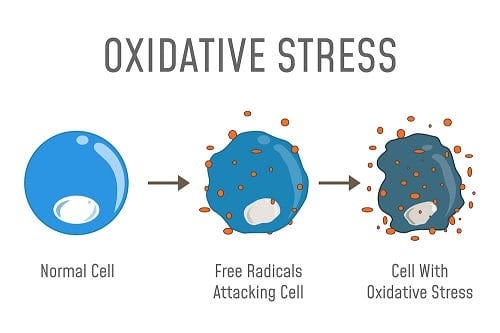What Causes Oxidative Stress and How Can I Fight It?
Medically Reviewed by Dr. Nicole Avena
In today’s world, our bodies are constantly being bombarded with free radicals that can wreak havoc on our cells.
If you feel sluggish and lack energy, you may be dealing with the effects of oxidative stress.
Let’s take a closer look at the role oxidative stress plays in the body, as well as some top nutrients that can help revitalize your body from within.
What is Oxidative Stress?

Antioxidants are molecules that can help neutralize free radicals. However, when there are too many free radicals and not enough antioxidants, oxidative stress can occur.
Put simply, oxidative stress is a natural process that occurs in the body when there’s an imbalance between free radicals and antioxidants.
Dangers of Oxidative Stress
While some degree of oxidative stress is necessary for our body to function properly, excessive levels can lead to cellular damage. This can have negative effects on various systems in the body, including the immune and cardiovascular systems, and even the brain. It also can play a role in aging and age-related decline in cognitive function.
Common Causes of Oxidative Stress
There are several factors that can contribute to increased levels of oxidative stress. Here are some common causes:
Poor Diet: A diet high in processed foods, refined sugars, trans fats, and low in antioxidants like fruits and vegetables, can lead to an imbalance between free radical production and antioxidant defense mechanisms in the body. This imbalance can promote oxidative stress.
Environmental Factors: Exposure to environmental pollutants such as air pollution, UV radiation from the sun, or other sources like tobacco smoke also can increase the levels of oxidative stress in our bodies.
Stress: Excessive physical or mental stress can trigger the release of cortisol – a prominent stress hormone – which produces ROS that can cause increased oxidative damage.
Inflammation: Inflammation is one of nature’s first responders to injury or infection. However, when inflammation becomes severe, it can produce excessive amounts of ROS leading to cell damage, which can contribute to oxidative stress.
Toxins: Our bodies are inundated with toxins every day through things we consume, like alcohol and medications, or other harmful substances we’re exposed to, like pesticides or heavy metals. These all can generate excess ROS, resulting in oxidative damage at the cellular level.
Sedentary Lifestyle: Regular physical activity may help reduce oxidative stress through the production of endogenous antioxidants. Conversely, a sedentary lifestyle may cause increased levels of oxidative stress in the body.
Age: As we age, our bodies become less efficient at neutralizing free radicals, which can lead to increased oxidative damage and reduced cellular repair processes.
Serious Illnesses: Many serious illnesses, such as cardiovascular and neurodegenerative issues, may be caused by increased oxidative stress and inflammation.
Genetics: Some individuals may inherit genetic mutations that can make them more prone to increased levels of oxidative stress and related health issues.
Lack of Sleep: Poor sleep or inadequate sleep may cause increased levels of oxidative stress and inflammation in the body.
How To Combat Oxidative Stress
The good news is that there are ways to combat oxidative stress and protect your body from its harmful effects.
These include:
- Eating a nutrient-dense diet with plenty of fruits and vegetables
- Engaging in regular exercise
- Managing stress through relaxation techniques like meditation or yoga
- Reducing exposure to environmental toxins by using natural cleaning products and avoiding smoking or secondhand smoke
Another effective way to combat oxidative stress is by including specific nutrients in your diet that have antioxidant properties. Here are some of the best nutrients to help reduce the effects of oxidative stress.
7 of the Top Nutrients to Help Reduce Oxidative Stress
- Coenzyme Q10
Coenzyme Q10 (CoQ10) is a compound found naturally in our bodies that acts as an antioxidant. Its primary role is to generate energy in the cells, but it also helps neutralize free radicals. Supplementation with CoQ10 may help reduce oxidative stress markers in people with heart and blood sugar issues.
- Curcumin
Curcumin is the active compound found in turmeric, a spice commonly used in Indian and Asian cuisines. It has potent anti-inflammatory and antioxidant properties that may help reduce oxidative stress by neutralizing free radicals.
- Glutathione
Glutathione is an antioxidant produced naturally within the body that plays a crucial role in reducing oxidative stress. It helps detoxify harmful compounds such as heavy metals and neutralizes free radicals to prevent cell damage. While glutathione supplements are available, eating foods rich in its precursors (cysteine and glycine) – such as eggs, garlic, and onions – can support its production.
- N-Acetyl L-Cysteine
N-Acetyl L-Cysteine (NAC) is a compound derived from the amino acid cysteine, which is a precursor to glutathione production. It acts as an antioxidant by replenishing glutathione levels in the body and helps protect cells from free radical damage. NAC supplementation may help reduce oxidative stress markers in people with persistent respiratory issues.
- Resveratrol
Resveratrol is a polyphenol compound found in red wine, grapes, and various fruits and vegetables. It has potent antioxidant and anti-inflammatory properties that make it a popular supplement for fighting oxidative stress. Resveratrol can protect cells from damage caused by free radicals and may help improve cognitive function, heart health, and longevity.
- Vitamin C
Vitamin C is a well-known vitamin that plays a crucial role in reducing oxidative stress by neutralizing free radicals. It helps protect cells from the damage caused by unstable molecules and may help improve immune function, heart health, and even anti-aging effects. Including foods rich in vitamin C – such as citrus fruits, berries, kiwi, broccoli, and bell peppers – into your diet can help provide a good dose of this powerful, versatile antioxidant.
- Vitamin E
Vitamin E is another potent antioxidant that can help reduce oxidative stress by protecting cell membranes from free radical damage. It works together with other antioxidants like vitamin C to enhance their effectiveness in combating oxidative stress. Excellent sources of vitamin E include nuts (almonds, hazelnuts), seeds (sunflower seeds), avocadoes, spinach, and olive oil.
Reduce the Effects of Oxidative Stress
Oxidative stress is a normal process that occurs in the body. When it becomes excessive, oxidative stress can cause significant damage to cells and tissues, which can lead to serious illnesses.
Adding these top 7 nutrients for reducing oxidative stress to your diet may help balance free radicals and antioxidants in your body, promoting overall health and well-being.
Always consult with a healthcare professional before adding any new supplements to your routine, especially if you’re taking any medications or have underlying health conditions.
At BrainMD, we’re dedicated to providing the highest purity nutrients to improve your physical health and overall well-being. For more information about our full list of brain healthy supplements, please visit us at BrainMD.
These statements have not been evaluated by the FDA. This content is for informational purposes only. It is not meant to substitute for medical or healthcare advice from a physician, nor is it intended to diagnose, treat, cure, or prevent any disease. Consult your healthcare provider before beginning a new health regimen.



